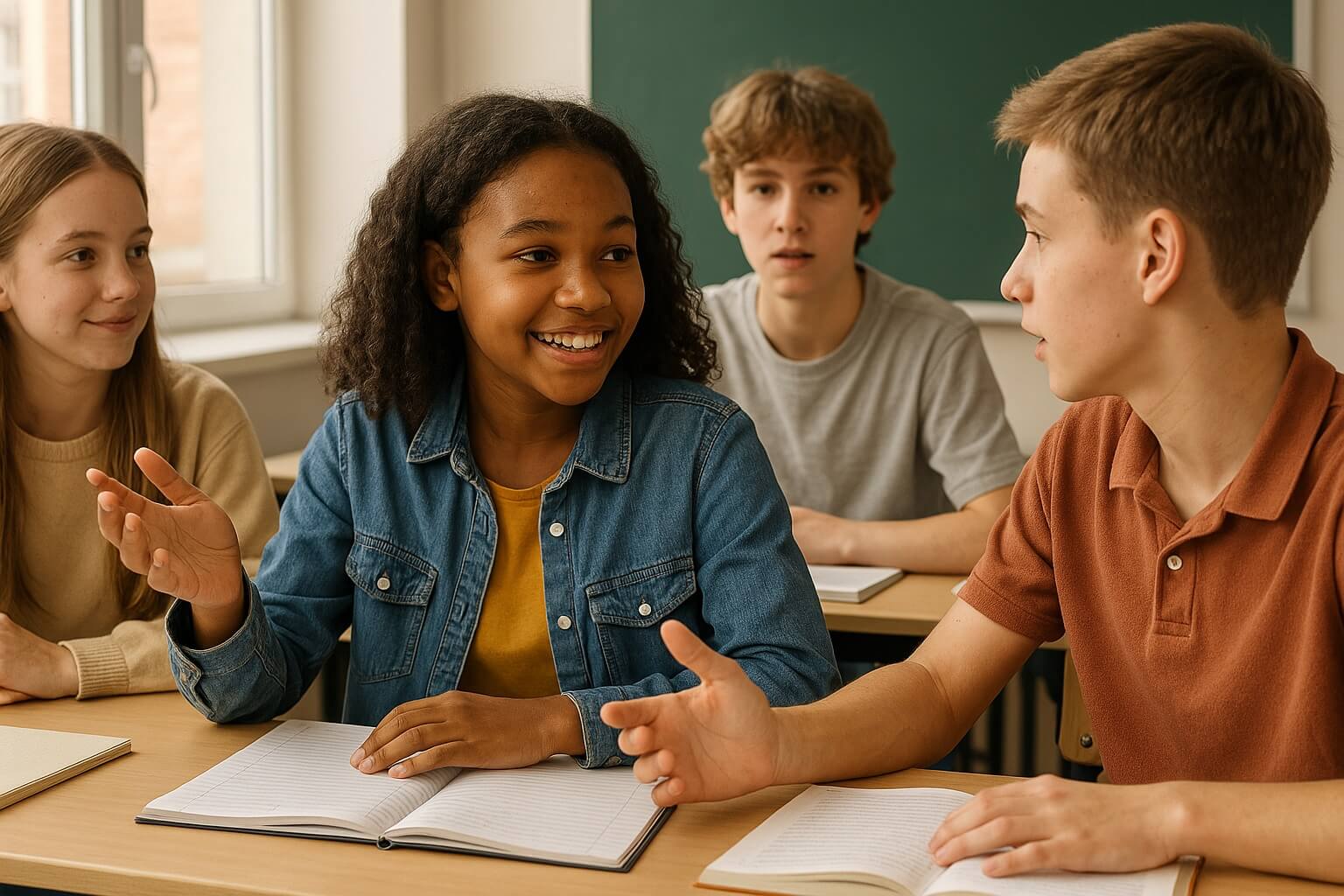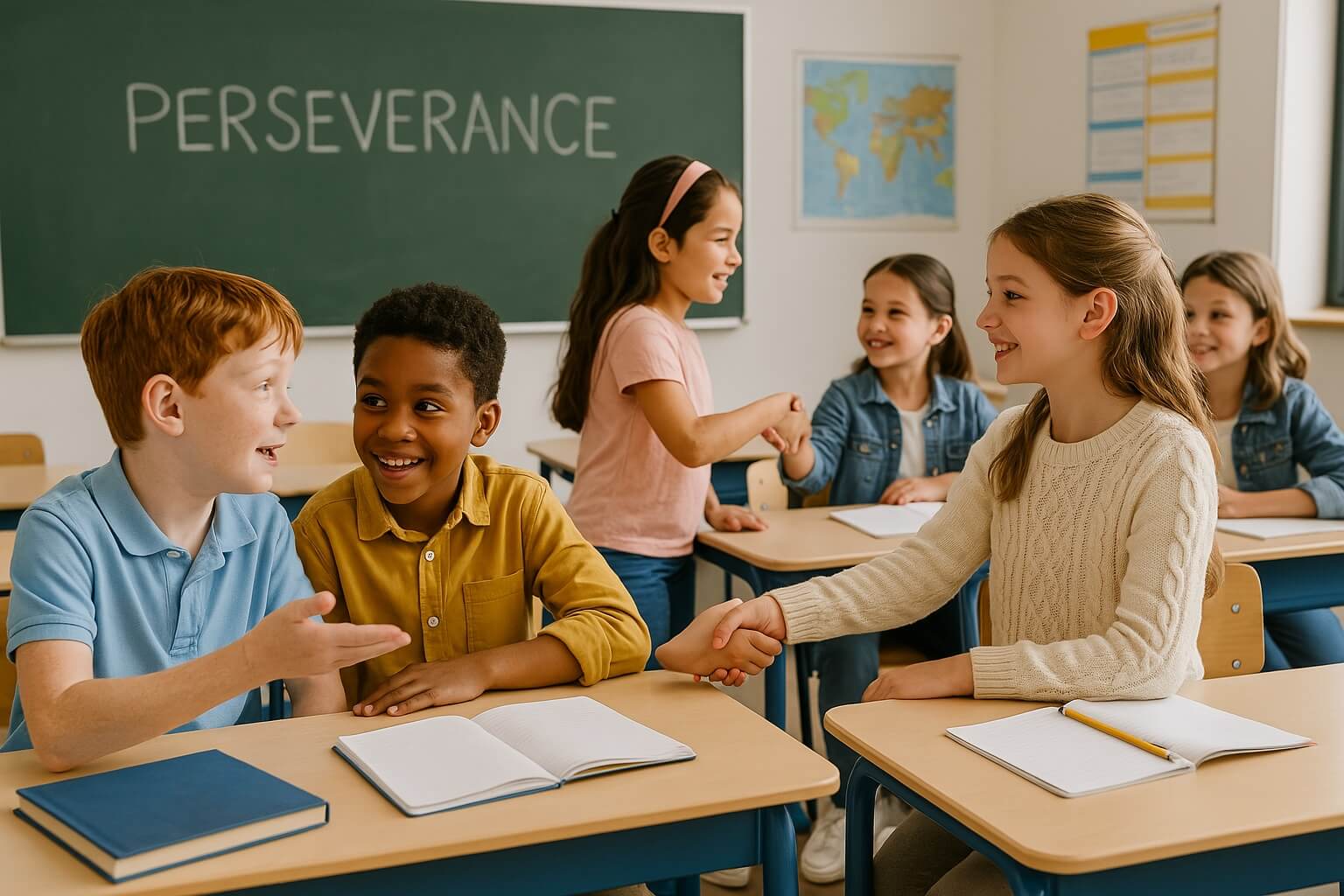
Walk into any classroom and you'll likely see students working in groups, asking questions, or reacting to each other’s ideas. But what often separates the students who thrive from those who struggle isn’t just test scores—it’s how well they interact with others. Social skills are the invisible threads that hold a class together. Learning becomes smoother when students communicate, collaborate respectfully, and handle emotions wisely.
Too often, kids enter school knowing their ABCs but not how to listen during group work or express disagreement without causing tension. This gap creates problems—not just for their classmates or teachers but also for their success. Students who lack social awareness may feel isolated, misunderstood, or discouraged from participating.
A report by CASEL found that students who developed social-emotional skills performed better academically and showed fewer behavioral problems. Another study by the OECD linked positive peer interactions with stronger problem-solving and learning outcomes.
The classroom is more than a space for academic content—it's a training ground for life. Whether a student is helping a peer with homework, resolving a misunderstanding, or working as part of a team, their social skills play a central role. That’s why this article explores the key social skills every student should build to thrive in school and beyond.
Table of Content
- What Do We Mean by Social Skills?
- Why Social Skills Directly Affect Learning
- Why These Skills Matter to Teachers
- How Parents and Educators Can Support Social Growth
- Programs That Teach Social Skills Effectively
- Life Beyond School: Why These Skills Stay Relevant
- Ways Students Can Practice Social Skills Daily
- What Research and Experts Say
- Clearing Up Common Misunderstandings
- Being Respectful in a Global Classroom
- Conclusion
- FAQs
What Do We Mean by Social Skills?
Social skills refer to how we behave, speak, and react in social situations. They include listening, sharing, resolving conflicts, taking turns, and showing empathy. In a school setting, social skills help students contribute to a group project, respect their teacher’s instructions, or comfort a feeling-down classmate.
Unlike personality traits, social skills are not fixed. They can be learned, practiced, and improved over time. These skills start developing at home but are tested and refined in the school environment.
Why Social Skills Directly Affect Learning

A student’s ability to get along with others doesn’t just make school more enjoyable—it affects their performance. A 2011 meta-analysis by CASEL involving over 270,000 students found that social-emotional learning programs improved academic outcomes by 11 percentile points.
When students feel included, respected, and heard, they’re more likely to ask questions, participate in discussions, and stay motivated. These habits drive academic success, not just memorization or test prep.
Listening Actively
Active listening means giving full attention to the speaker, making eye contact, and asking follow-up questions to show interest. It’s one of the most basic and powerful skills in a classroom.
Students who listen well understand instructions clearly, avoid careless mistakes, and value others' thoughts. This builds mutual respect and makes group work more efficient.
Expressing Ideas Clearly
Good communication isn’t about talking the most—it’s about making sure others understand you. Students should learn to share opinions clearly and respectfully.
This might mean using simple language, staying on topic, and reading the room to determine when and how to speak up. These habits help during class discussions and presentations.
Respecting Different Opinions
Not everyone will see things the same way, and that’s okay. However, students must understand how to disagree without being rude or dismissive.
Classrooms thrive when learners are open to different viewpoints. It encourages critical thinking and creates a space where all voices matter.
Team Collaboration
Students often work in groups, whether it’s a science experiment or a history project. Those who can share responsibility, give credit, and compromise without drama are far more successful.
According to the OECD, students with strong collaboration skills tend to score higher on problem-solving tasks and adapt better to new challenges.
Resolving Conflicts Peacefully
Disagreements are part of any group setting. What matters is how students handle them. Yelling or avoiding each other rarely helps. Instead, students should be taught to stay calm, explain their feelings, and find a fair solution.
These conflict-resolution skills are just as important as knowing the answers on a test.
Asking for Help Without Fear
Many students avoid asking questions because they worry it will make them look weak. But knowing when and how to ask for help is a strength, not a flaw.
Encouraging this behavior reduces anxiety and helps students grasp complex concepts faster. A Harvard Graduate School of Education study found that help-seeking is strongly linked to academic resilience.
Managing Emotions in Social Settings
School can be stressful, especially during exams, group work, or peer pressure. Students need emotional control so they do not lash out or withdraw during challenging moments.
Teaching emotional regulation helps students pause, think, and respond instead of reacting, stabilizing the whole classroom environment.
Following Instructions and Routines
Classrooms run on routines. Students must follow directions, whether submitting homework or lining up after recess.
Those who can do this consistently contribute to a smoother, more focused learning experience—for themselves and everyone around them.
Accepting Feedback Positively
Feedback isn’t always easy to hear—but it’s how we grow. Students who learn to accept constructive criticism without defensiveness improve faster and build stronger relationships with teachers.
Schools that encourage a growth mindset make feedback a regular part of learning, not something to fear.
Appreciating Cultural and Personal Differences
Modern classrooms are diverse. Students come from different cultures, backgrounds, and belief systems. Respecting those differences is key to building a community of trust.
When students learn to appreciate diversity, they gain perspective, reduce prejudice, and build friendships beyond surface-level interactions.
Why These Skills Matter to Teachers
Teachers often say they could teach better if they didn’t have to manage behavior issues all day. Educators can do their jobs more effectively when students cooperate, stay focused, and help one another.
Social skills reduce disruptions and create a better learning environment for everyone.
Challenges That Block Social Skill Development
Several factors can delay or prevent students from developing strong social behaviors:
-
Too much screen time and not enough face-to-face interaction
-
Limited opportunities to work in groups or practice speaking
-
Family environments where respectful conversation isn’t modeled
-
Emotional or developmental conditions that affect behavior
Addressing these barriers early is essential.
How Parents and Educators Can Support Social Growth
Social skills aren’t taught through lectures. They’re learned through practice, modeling, and feedback. Here’s how adults can help:
-
Set clear expectations and routines
-
Praise respectful and cooperative behavior
-
Talk openly about emotions and listening
-
Use role-playing to practice real-life scenarios
Every small step reinforces good habits.
Programs That Teach Social Skills Effectively
Schools don’t need to reinvent the wheel. Several evidence-based programs already exist:
-
Second Step: Teaches empathy, emotion management, and decision-making
-
PATHS (Promoting Alternative Thinking Strategies): Helps students navigate peer conflict and regulate emotions
-
Responsive Classroom: Builds a positive school climate through morning meetings and cooperative activities
These programs are backed by research and used in thousands of classrooms globally.
Life Beyond School: Why These Skills Stay Relevant
Social skills affect more than grades. They are also tied to future job success, healthy relationships, and emotional well-being.
Employers now rank collaboration, communication, and emotional intelligence as top hiring factors. The earlier students learn these skills, the more prepared they will be for life beyond graduation.
Ways Students Can Practice Social Skills Daily
-
Join a team or school club
-
Volunteer to help classmates
-
Greet teachers and peers by name
-
Ask open-ended questions in group discussions
-
Write down three things they did well socially each day
Small efforts, when repeated, create lasting change.
What Research and Experts Say
Dr. Mark Greenberg, a leading researcher in SEL, says, “Social skills are built in real-life moments. They’re not extra—they’re part of learning itself.”
Harvard researchers found that students who build social competence early are 54% more likely to graduate from high school and hold full-time jobs as adults.
That’s a powerful return on investment for a set of skills often ignored.
Clearing Up Common Misunderstandings
-
Social skills aren’t just for extroverts. Quiet students benefit from them, too.
-
You can’t fake empathy—it grows through genuine connection.
-
Conflict doesn’t always mean something went wrong. It’s an opportunity to grow.
Let’s stop seeing social skills as side lessons. They deserve front-row attention.
Being Respectful in a Global Classroom
As more classrooms become multicultural, sensitivity to different customs, accents, and ways of expressing oneself matters. Students should learn to:
-
Ask questions without making assumptions
-
Avoid mocking or judging differences
-
Celebrate holidays, food, and languages other than their own
Inclusive behavior makes classrooms welcoming for everyone.
Conclusion
Academic knowledge may get students through school, but social skills shape how they live, lead, and connect with others. From raising a hand respectfully to leading a team project, these behaviors aren’t background extras—they’re the core of a successful classroom experience.
Schools that nurture social development create not only better learners but better citizens. The work starts early, and never really ends.
FAQs
1. What’s the best way to teach social skills to young students?
Use stories, games, and modeling. Kids learn more by watching and doing than by listening to lectures.
2. Are social skills taught in every school?
Not always. Some schools have dedicated SEL programs, while others rely on teachers to build these skills informally.
3. Can shy students learn social skills?
Yes. Social growth doesn’t require being loud—being present, kind, and open.
4. How do you measure social skill development?
Through observation, peer feedback, and reflection exercises. It’s not about tests—it’s about behavior change.
5. Do social skills help with mental health?
Yes. Strong peer relationships, clear communication, and emotional awareness support mental well-being.
Study Tips Students




